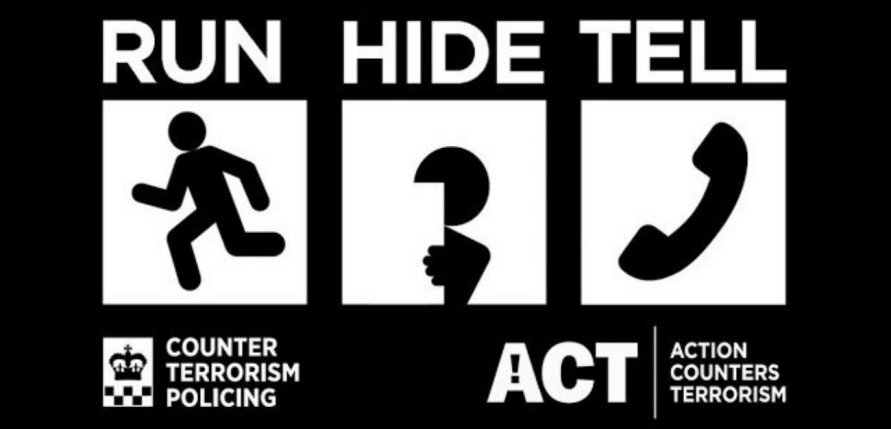
It’s almost 12 months since a suicide bomber detonated his explosive device at a music concert in Manchester. Twenty-two people were killed and many more injured in this devastating attack. At the time there was lots of advice about what you should do if you get caught up in a terrorist attack, and with the anniversary of this event drawing close we thought it would be a good time for a reminder.
Action Counters Terrorism (ACT)
“The National Counter Terrorism Security Office (NaCTSO) is a police unit that supports the ‘protect and prepare’ strands of the government’s counter terrorism strategy” NaCTSO provide advice and support for individuals and businesses to prepare for a potential terrorist attack.
Part of daily life now is about being alert to anything suspicious. Behaviour, vehicles, packages, bags; public places are the most likely targets so keep a watch for anything unusual.
Trust your instincts and ACT. Report your concerns; its easy and confidential, call the police on 0800 789 321 (or 999 in an emergency), or complete an online form. The website www.gov.uk/ACT tells you what happens when you make a report and also provides educational resources for parents and teachers.
During an incident
If you are unlucky enough to find yourself caught up in an attack the government provides clear, concise advice on what you should do.
- RUN: to a place of safety. This is a far better option than to surrender or negotiate. If there’s nowhere to go, then…
- HIDE: It’s better to hide than to confront. Remember to turn your phone to silent and turn off vibrate. Barricade yourself in if you can. Then finally and only when it is safe to do so…
- TELL: the police by calling 999
Terrorism Awareness Training
Project Griffin and Project Argus have been the governments two main counter terrorism training programmes for organisations in the UK. Project Griffin has just been replaced by ACT Awareness eLearning.
Travelling abroad
Holiday season is approaching and although it’s the last thing you want to think about, it is always worth being prepared in case of an attack. Statistically it is unlikely to happen, but over recent years we’ve seen terrorist attacks in France, Germany, Spain, Australia, Tunisia and Egypt among others.
Make sure you know the local emergency numbers and remember the RUN, HIDE, TELL advice; keep your eyes open for possible hiding places.
Travel risk expert, Lloyd Figgins explained to Express.co.uk some of the best ways to stay safe. He recommends a jewellery store as a good place to run to in the event of a terrorist attack.
“They are good places to go to. You have to remember that they have CCTV, panic buttons and shutters.
If you were to go into one, they can just press a button and call the police.
Tell them there is a terrorist attack out there and they need to get the shutters down.”
Threat levels
- LOW means an attack is unlikely.
- MODERATE means an attack is possible, but not likely
- SUBSTANTIAL means an attack is a strong possibility
- SEVERE means an attack is highly likely
- CRITICAL means an attack is expected imminently
Stay aware of the current threat levels - www.mi5.gov.uk/threat-levels

